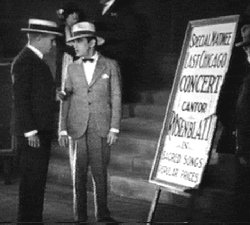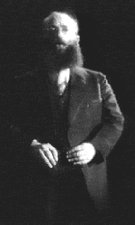

Chap 36: Pioneering the Talkies
All this recognition and acclaim could not prevent the gradual decline of that new
source of income that had been the cause of the temporary upturn of my father's
fortunes. By the irony of fate he himself unwittingly had a part, minor though it was,
in helping reduce the importance of vaudeville as the most popular form of
amusement, next to the cinema, of the American masses. The Warner Brothers, who
had lost a fortune in the silent movies, and were virtually bankrupt, were just then
toying with a new idea. They were going to produce pictures which, in addition to
doing pantomime, would have the actors speak and sing. For their first presentation
they chose "The Jazz Singer," an assured Broadway success in which George Jessel
had starred with great credit. Based on the life of the black-faced idol of musical
comedy, Al Jolson, it is the story of the son of a cantor who became a singer of
popular dance music. My father had once been asked for his opinion on the
authenticity and effectiveness of the play and had given it his enthusiastic
endorsement. It now occurred to the Warners that if Josef Rosenblatt could be
induced to take the role of the cantor in this first "talkie," or "Vitaphone picture" as
they called it, it would be a sure hit. Who wouldn't go to see it? Everybody, Jew and
gentile, would be attracted by the name and voice of the principal star, and they, the
producers, would be on their feet again. The only question in their minds was: "Will
Josef Rosenblatt accept?" They knew of his religious scruples, of his having turned
down on previous occasions the most flattering offers to enter the opera because it
would have involved a little bit of acting. But perhaps this time, on account of his
financial troubles, which had made him amenable to entering into vaudeville, he
might be induced to stretch a point and sing for Vitaphone.
So one day in the spring of 1927 they sent three of their agents to speak to my father
in person at his home and sound him out in regard to their plans for him.
"Mr. Rosenblatt," they said, introducing themselves, "we are a committee
representing Warner Brothers."
"The moving picture producers?"
"Yes."
"And to what do I owe the honor of your visit?"
"You are no doubt familiar with the play 'The Jazz Singer.'"
"The one George Jessel starred in?"
"That's right. What do you think of it?"
"An excellent play."
"Well, our company is thinking of producing it on the screen with sound effects. The
actors would not only be seen, but heard as well, and we were wondering whether we
couldn't induce you to take the part of the father and sing some of your own
liturgical compositions. We are willing to compensate you well for your efforts.
There would be hardly any acting involved for you. All you would have to do is stand
before the pulpit or sit at your table, as you are accustomed, and sing."
"I feel highly complimented and flattered by your offer, gentlemen. But you know
what my position in these matters has always been and remains. The answer is 'No.'"
"Mr. Rosenblatt, we have been authorized to go as high as $100,000 if you could see
your way clear. Think of what it would bean for raising the prestige of the Jew and
his faith if a man like you were to be held up as its representative to the non-Jewish
public."
"There is no use talking, my friends. I appreciate your good intentions as well as your
generosity. But there isn't enough money in the world to make me profane my sacred
calling by putting on an act anywhere, whether it be on the screen or the stage.
Besides in order that my face might photograph well, I would have to use some make-up, and that is definitely out."
Seeing him so unalterably opposed to any active role and eager to find some tie-up for
my father with the proposed talkie so that their plan might not fall through
altogether, the Warner Brothers' emissaries made another proposal. "We see that we
can't make even a little bit of an actor out of you, Mr. Rosenblatt. But how about
just letting us have the use of your voice, without your being seen, in selections like
let us say, 'Kol Nidre' and 'Umipnei Chatoeinu'? That might be of some help to us in
our plans."
"Did you say 'Kol Nidre,' that hallowed prayer that is chanted by the cantor at the
inauguration of the holiest day of the year? Under no circumstances would I permit
that to pass my mouth anywhere except in a house of G-d."
"Is there then nothing that you could do for us?" pleaded the negotiators.
"I am afraid there isn't, gentlemen," said my father firmly, and it seemed for the last
time.
The Warner agents left crestfallen, disappointed, their mission unfulfilled. Later, as a result of negotiations back and forth, something was worked out. My father agreed, provided he was not photographed, to sing Rachem and several other such non-liturgical Jewish melodies for the Vitaphone production. But even that necessitated his presence in Hollywood in order to make certain that there would be no snag in the synchronization. The Warner Brothers could not afford to leave anything to chance in their first talkie. And so for eight weeks during this summer and in return for $10,000 plus expenses, my father came, accompanied by my mother, Leo and Doris, to Los Angeles as the guest of the Warner Brothers.
 |
|
 |